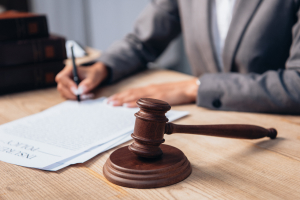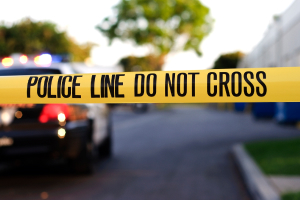
Whenever a person gets killed because of a vehicle's reckless, drunk, or drugged driving, that person is guilty of vehicular manslaughter. The penalties are severe and include extended periods of imprisonment.
If you face vehicular manslaughter charges, contact the Los Angeles vehicular manslaughter defense attorney at Hurwitz Law Group for a consultation. Our criminal defense attorneys have handled many vehicular manslaughter cases so you can trust our experience and knowledge of the law.
To schedule your free consultation, please call (323) 916-9019. More severe consequences await you if convicted. Please do not wait to contact our office to help you defend yourself!

Hiring an experienced vehicular manslaughter lawyer can help you get your deserved compensation. A vehicular manslaughter conviction can lead to severe penalties, such as long-term incarceration, steep fines, and losing your driver's license by law.
It would be best to have a solid case to fight these allegations. Talk to our skilled defense team today so we can put together an effective defense plan to guide you through this challenging time in your life.
The offense of vehicular manslaughter is legally defined as follows in California Penal Code Section 192(c):
Driving a vehicle while committing an unlawful act, not amounting to a felony, and with gross negligence. Or driving while committing a lawful act that could result in death or an illegal manner with gross negligence. Driving a car in which a collision was induced for financial gain resulted in another individual's death.
According to the legal definition, vehicular manslaughter always occurs while operating a motor vehicle, and unintended homicide is caused by ordinary or gross negligence.

Some states distinguish between vehicular homicide and vehicular manslaughter. In those states, vehicular homicide is a more severe charge than vehicular manslaughter, and it often entails recklessness or negligence, resulting in another person's death.
In California, all incidents of wrongful death using a motor vehicle are classified as vehicular manslaughter, the degree of which varies between gross negligence and misdemeanor vehicular manslaughter.
In basic terms, ordinary negligence is failing to use reasonable care to prevent reasonably foreseeable harm to another person.
It means you are negligent if you act in a way a reasonable person would not act in the same manner in the same situation. In contrast, gross negligence is much more than just ordinary carelessness.
It means you were grossly negligent if you acted in a reckless way that created a situation of a high risk of death or significant bodily injury. A reasonably careful person would have known that acting in that manner would make such a risk.
Some examples where the Los Angeles County prosecutor will argue you acted with gross negligence include situations where you were:
Call experienced criminal defense attorneys at our office for more information.

To achieve a conviction for vehicular manslaughter under PC 912(c), the Los Angeles County prosecutor must be able to prove all of the components of the crime beyond a reasonable doubt.
These components are as follows:
As you may see from the material above, determining ordinary or gross negligence is the most critical aspect of vehicular manslaughter trials.
Again, ordinary negligence means that you failed to use reasonable care to protect another person from reasonably expected injury.
Typical examples are:
California has various classifications of vehicular manslaughter. It is essential to know the following categories to identify which type you get charged with.
A prosecutor must persuade a jury that specific facts of the case are actual to convict you of a crime. These are referred to as the "components of the crime." According to California Penal Code 192(c)(1), there are four factors to vehicular manslaughter with gross negligence:
Under California Penal Code 192(c)(2), misdemeanor vehicular manslaughter consists of the same four components as vehicular manslaughter with gross negligence, with one crucial distinction.
That is, the offense was committed with ordinary negligence. It indicates that the act occurred because you failed to take reasonable precautions to prevent the reasonably foreseeable injury to another person.
Another form of vehicular manslaughter mentioned in PC 192(c)(3) is referred to as "vehicular manslaughter for monetary advantage." It occurs if:
In other terms, it is vehicular manslaughter if you accidentally kill another person while intentionally crashing a car to commit insurance fraud.
If you cause the death of another person while driving under the influence, you will face a charge under Penal Code 191.5. This type of unintentional vehicular manslaughter is distinct from the offense outlined in PC 192. (c).
It only applies if you get accused of causing the death of another person while driving under the influence of alcohol or drugs.
As a wobbler, this offense carries the following penalty:
In Penal Code 191.5(a), gross vehicular manslaughter while intoxicated is defined as the unlawful killing of another person while driving under the influence and with gross negligence. It is a crime punishable by up to four, six, or ten years in a California state prison.

Under California law, vehicular manslaughter with gross negligence is punished as a "wobbler." It implies that depending on the facts of the case and your previous background, it might be a felony or a misdemeanor.
Vehicular manslaughter with gross negligence is a felony punishable by:
All other misdemeanor vehicular manslaughter instances have the following penalties:
If you get convicted of PC 192(c)(1) vehicular manslaughter with gross negligence or PC 192(c)(3) vehicular manslaughter for financial gain, your driver's license will be revoked by the California DMV.
You can also not reinstate your license for at least three (3) years after the revocation date. If you drive while your suspended license, you will face extra charges under Vehicle Code 14601 VC for driving on a suspended license.

If you're facing a vehicular manslaughter charge, your life is pretty scary. The good news is that there are many defenses against a vehicular manslaughter charge. Here are some of the most common:
Officers frequently testify about visible signs of intoxication, such as bloodshot eyes, slurred speech, and a slow reaction time. Other factors, such as illness or allergies, could be causing these symptoms.
When balance, coordination, and memory are tested, field sobriety tests fail to account for physical or mental disabilities. Breathalyzers are not always accurate. Results can vary depending on calibration, body weight, and temperature.
Attorneys can also help you defend against a negligent manslaughter charge by demonstrating that you did not act with ordinary negligence during the incident. Your actions could have been motivated by something, such as an emergency to which you were responding.
A car accident can result in a variety of fatalities. A person is not automatically guilty simply because they were intoxicated during the accident. Instead, the prosecutor must prove that the defendant's actions were the cause of death.
Your attorney can call into question those allegations by bringing up other possible causes of death, such as a lack of safety features and other vehicles that may have been involved.
Our Los Angeles vehicular manslaughter defense lawyer at Hurwitz Law Group has a track record that resulted in not-guilty verdicts. We have successfully defended clients with severe charges and felony offenses, including manslaughter, gross vehicular manslaughter while intoxicated, and more.
It would help to have a criminal defense lawyer with the experience and track record to defend you and your case. Our firm's thoroughness and attention to detail distinguish us from other law firms.

You're shocked and overwhelmed by the charges you're facing. We'll fight on your behalf to get you the best outcome possible. Contact our experienced vehicular manslaughter attorney at Hurwitz Law Group now. Call (323) 274-1916 or complete the form to get your free, confidential consultation.